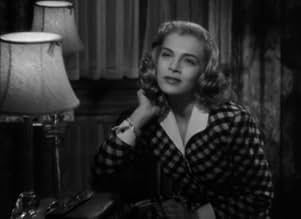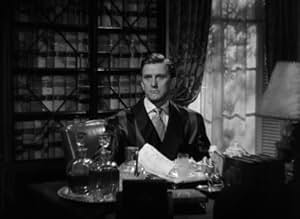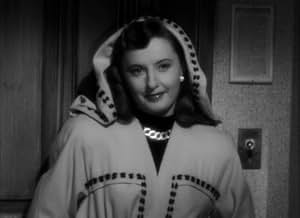A man is reunited with his childhood friend and her husband who believes he knows the truth about the death of her rich aunt years earlier.A man is reunited with his childhood friend and her husband who believes he knows the truth about the death of her rich aunt years earlier.A man is reunited with his childhood friend and her husband who believes he knows the truth about the death of her rich aunt years earlier.
- Director
- Writers
- Stars
- Nominated for 1 Oscar
- 2 wins & 2 nominations total
Gene Ashley
- Man
- (uncredited)
Walter Baldwin
- Dempsey
- (uncredited)
Gino Corrado
- Nightclub Waiter
- (uncredited)
Catherine Craig
- French Maid
- (uncredited)
- Director
- Writers
- All cast & crew
- Production, box office & more at IMDbPro
Featured reviews
Odd title to this movie. There's never any love in the Martha Ivers' circle. She never got enough chance in early life to become acquainted with the real article. Her dye is already cast by the time the old boyhood friend shows up again. You only get to actual love with Sam and Toni, or especially Sam for Toni. He's a sensitive and caring fellow. Martha needed his influence for that reason. Maybe he could have helped her be human had he been able to stay around early on.
I had trouble focusing on the unfoldings at the beginning due to recognition of the aunt, Judith Anderson. Why, that's Mrs. Danvers from "Rebecca." Same creepy type of woman.
**Possible spoiler paragraph** It is interesting to watch this again with what you learn from the first viewing. About Sam, that is, and what he doesn't know. You watch it the first time with everyone thinking that Sam is back to cash in on what he knows about the aunt's demise. You know better than that, that the return is accidental and the revisit spontaneous. But you have no reason not to think he saw what happened on the stairs. Then, he seems pretty indifferent to the event as he reacquaints. You think, well, he doesn't care. But then we learn that he left the house before it happened. Now, watch it again with that in mind.
Everyone notices Kirk Douglas. He's so attractive you wish for him to be a more virile character. Didn't have to wait very long for that to come about. There were a couple more weak guy roles, and then he took off with mastery. And, a case could be made for it requiring ability to play a weak person as well as a stronger one.
Van Heflin - Something very attractive about him. He was almost always a guy with inner stability, aiding the balance of those around him, usually women. To me, that inner quality WAS his attractiveness. He's the one that could always walk into a mess and immediately start sorting it out.
Lizabeth Scott had a certain strong allure that seemed could have gone best with a stronger character. I don't have much patience with the pathetic drama she dishes out here. Those weepy, tragic type dames showed up a lot in the streetwise pictures of the era, and I always found them irritating. Usually, they have some guy like Heflin trying to bolster them up because some bully type is grinding them down. If you ask me, that type is asking to be ground. "Good grief; give it a rest, sister," I say to the screen. Oh well, nowadays we can fast forward.
Barbara Stanwyck is at the height of her beauty here or maybe one of her more glamorous roles. She seemed slated to be an evil woman or remembered most for those roles. In contrast, I recall her in an early picture called "The Mad Miss Manton," in which she is an airhead bounding around all over the place. That was really enjoyable, but it was a type that she would naturally move away from to go on to other things. But she was really fun to watch in that.
If you don't mind walking on the dark side a bit, this is an interesting one to watch.
I had trouble focusing on the unfoldings at the beginning due to recognition of the aunt, Judith Anderson. Why, that's Mrs. Danvers from "Rebecca." Same creepy type of woman.
**Possible spoiler paragraph** It is interesting to watch this again with what you learn from the first viewing. About Sam, that is, and what he doesn't know. You watch it the first time with everyone thinking that Sam is back to cash in on what he knows about the aunt's demise. You know better than that, that the return is accidental and the revisit spontaneous. But you have no reason not to think he saw what happened on the stairs. Then, he seems pretty indifferent to the event as he reacquaints. You think, well, he doesn't care. But then we learn that he left the house before it happened. Now, watch it again with that in mind.
Everyone notices Kirk Douglas. He's so attractive you wish for him to be a more virile character. Didn't have to wait very long for that to come about. There were a couple more weak guy roles, and then he took off with mastery. And, a case could be made for it requiring ability to play a weak person as well as a stronger one.
Van Heflin - Something very attractive about him. He was almost always a guy with inner stability, aiding the balance of those around him, usually women. To me, that inner quality WAS his attractiveness. He's the one that could always walk into a mess and immediately start sorting it out.
Lizabeth Scott had a certain strong allure that seemed could have gone best with a stronger character. I don't have much patience with the pathetic drama she dishes out here. Those weepy, tragic type dames showed up a lot in the streetwise pictures of the era, and I always found them irritating. Usually, they have some guy like Heflin trying to bolster them up because some bully type is grinding them down. If you ask me, that type is asking to be ground. "Good grief; give it a rest, sister," I say to the screen. Oh well, nowadays we can fast forward.
Barbara Stanwyck is at the height of her beauty here or maybe one of her more glamorous roles. She seemed slated to be an evil woman or remembered most for those roles. In contrast, I recall her in an early picture called "The Mad Miss Manton," in which she is an airhead bounding around all over the place. That was really enjoyable, but it was a type that she would naturally move away from to go on to other things. But she was really fun to watch in that.
If you don't mind walking on the dark side a bit, this is an interesting one to watch.
A very good feature that seems to be a soap-opera with touches of film-noir. Barbara Stanwyck plays the femme fatale not as cold-blooded as her earlier turn in "Double Indemnity" ,but her "Martha Ivers" is one really selfish lady. And Stanwyck is as usual very good. For me the best performance comes from the always reliable Van Heflin who magnificently manages to almost carry the whole film. Kirk Douglas, in his debut, is very good as the weakling husband of Stanwyck. Lizabeth Scott who plays the most sympathetic character in the movie is very able and memorable.The movie is at almost two hours perhaps a tad long,but it is well worth investing those two hours.
A powerhouse cast is assembled for "The Strange Love of Martha Ivers." It's a treat to watch this able quintet at work, making for an engrossing film experience.
Barbara Stanwyck is at her peak--sure, confident, and unfailing. Van Heflin's natural talent makes everything he does seem effortless. Kirk Douglas offers a most impressive film debut in what, in retrospect, is an uncharacteristic role. Lizabeth Scott (who seems to me a fascinating cross between Lauren Bacall and Rosemary Clooney) is constantly engaging. Long after her part has faded, Scott's image remains indelibly fixed in the memory. And finally, the great Judith Anderson is on in a strong character role.
Miklos Rozsa's compositional style is remarkable in its adaptablity. Close one's eyes, and the film could well be set a thousand years earlier--or any point in between. Which is to say, it's general, while at the same time, specific.
The writing team headed by Robert Rossen created a slick and saucy script, which holds interest throughout, and Hal B. Wallis was sharp enough to retain this productional team formula for many years. Were the film to have been given a perhaps more poetic--less Gothic--title, it might have enjoyed even greater stature in the annals of the genre.
As it is, "Ivers" is a worthy member of the noir film family.
Barbara Stanwyck is at her peak--sure, confident, and unfailing. Van Heflin's natural talent makes everything he does seem effortless. Kirk Douglas offers a most impressive film debut in what, in retrospect, is an uncharacteristic role. Lizabeth Scott (who seems to me a fascinating cross between Lauren Bacall and Rosemary Clooney) is constantly engaging. Long after her part has faded, Scott's image remains indelibly fixed in the memory. And finally, the great Judith Anderson is on in a strong character role.
Miklos Rozsa's compositional style is remarkable in its adaptablity. Close one's eyes, and the film could well be set a thousand years earlier--or any point in between. Which is to say, it's general, while at the same time, specific.
The writing team headed by Robert Rossen created a slick and saucy script, which holds interest throughout, and Hal B. Wallis was sharp enough to retain this productional team formula for many years. Were the film to have been given a perhaps more poetic--less Gothic--title, it might have enjoyed even greater stature in the annals of the genre.
As it is, "Ivers" is a worthy member of the noir film family.
This is a well-written, well-acted, thoroughly absorbing film noir. The always-great Barbara Stanwyck is at her sultriest as Martha, and Van Heflin is incredibly sexy and masculine as Sam. Watching this movie, you wouldn't think Kirk Douglas, who plays the weak-willed, alcoholic Walter, would soon become a bigger star than Heflin and play the tough, romantic hero parts like Sam Masterson. Douglas excelled at those parts, as he did with a very different type of part in this movie, but I can't help thinking that if Heflin had gotten more of those roles, he would have been just as big a star. Husky-voiced Lizabeth Scott rounds out the star foursome nicely as Toni, a wrong-side-of-the-tracks girl who's been burned by trusting the wrong men. This movie, more than most of its era, trades in shades of gray; the "bad" characters, Martha and Walter, have reasons for the evil they do, while the "good" characters, Sam and Toni, are no angels--he's a decorated war hero, but he makes his living by gambling and once killed a man in self-defense, while she just got out of jail. This complexity adds to the film's interest. The film also provides a believable depiction of small-town life; it's realistic, no Bedford Falls. The flashback portraying several of the characters as teenagers has the spark of reality as well. Highly recommended.
Martha Ivers, a young girl under the guardianship of her grandmother played by Judith Anderson, tries often to run away, but is brought back every time. Grandma is one powerful autocratic and twisted old woman. One night after Grandma kills the girl's cat, she kills her. Her tutor's son sees the deed and now has blackmail power. Young Martha also thinks someone else has seen the deed, young Sam Masterson who she has a yen for. He actually skedaddled before witnessing anything.
Flash forward several years. Now everyone is grown up. Barbara Stanwyck is Martha and she's married the tutor's son played by Kirk Douglas in his film debut. He's also the District Attorney. And the main action of the film begins as grown up Sam Masterson who is played by Van Heflin comes back to his home town. He's treated rather strangely and it takes him a while to figure out why.
Life has a funny way of working out and Stanwyck has essentially turned into Anderson. Heflin is no real hero here either, he's quite willing to engage in some blackmail. But he's redeemed somewhat by the love of another girl from the wrong side of the tracks, Lizabeth Scott.
The film is memorable for two reasons, the power packed performance of Barbara Stanwyck and the debut of Kirk Douglas. This is a choice Barbara Stanwyck role, a powerful ruthless woman who'll do anything to keep and protect what's hers.
It's odd that Kirk Douglas makes his debut as a weakling, but even stranger that the dynamism that is his screen trademark is so well hidden in this portrayal. This part isn't exactly Spartacus. But Kirk is one capable player.
Heflin and Scott do well in their respective parts, but even though she's only on the screen for the first 15 minutes the one you won't forget is Judith Anderson. Seeing Stanwyck with her machinations later on, you wonder what must have made Anderson such a twisted human being.
The Strange Loves of Martha Ivers is a well plotted melodrama that does credit to all involved.
Flash forward several years. Now everyone is grown up. Barbara Stanwyck is Martha and she's married the tutor's son played by Kirk Douglas in his film debut. He's also the District Attorney. And the main action of the film begins as grown up Sam Masterson who is played by Van Heflin comes back to his home town. He's treated rather strangely and it takes him a while to figure out why.
Life has a funny way of working out and Stanwyck has essentially turned into Anderson. Heflin is no real hero here either, he's quite willing to engage in some blackmail. But he's redeemed somewhat by the love of another girl from the wrong side of the tracks, Lizabeth Scott.
The film is memorable for two reasons, the power packed performance of Barbara Stanwyck and the debut of Kirk Douglas. This is a choice Barbara Stanwyck role, a powerful ruthless woman who'll do anything to keep and protect what's hers.
It's odd that Kirk Douglas makes his debut as a weakling, but even stranger that the dynamism that is his screen trademark is so well hidden in this portrayal. This part isn't exactly Spartacus. But Kirk is one capable player.
Heflin and Scott do well in their respective parts, but even though she's only on the screen for the first 15 minutes the one you won't forget is Judith Anderson. Seeing Stanwyck with her machinations later on, you wonder what must have made Anderson such a twisted human being.
The Strange Loves of Martha Ivers is a well plotted melodrama that does credit to all involved.
Did you know
- TriviaKirk Douglas earned this, his debut role, with the help of his old drama school friend Lauren Bacall who knew that producer Hal B. Wallis was looking for fresh talent, and she suggested Douglas to him. She encouraged Wallis to watch a play featuring Douglas. When he did, Wallis was so impressed by his performance that he cast Douglas in this film.
- GoofsBefore taking the shower in the hotel, while slipping her coat of, Toni winks up in the air with her left eye and shows a little smirk apparently to someone from the film crew.
- Quotes
Sailor: [after Sam has crashed his car] What happened?
Sam Masterson: The road curved, but I didn't.
- Crazy creditsOpening credits prologue: IVERSTOWN 1928.
- ConnectionsFeatured in Paramount Presents (1974)
Details
- Release date
- Country of origin
- Official sites
- Language
- Also known as
- El extraño caso de Martha Ivers
- Filming locations
- Los Angeles, California, USA(Southern Pacific Railroad yard)
- Production company
- See more company credits at IMDbPro
- Runtime
- 1h 56m(116 min)
- Color
- Aspect ratio
- 1.37 : 1
Contribute to this page
Suggest an edit or add missing content






































